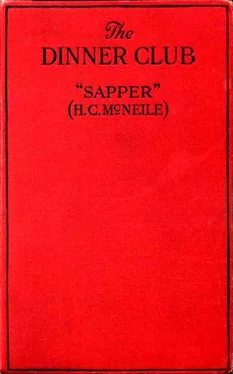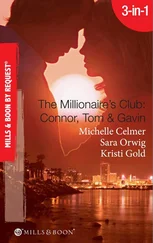“ ‘I give him a month,’ he said. ‘It’s galloping consumption.’
“It was just about a month later that the thing happened which I had been dreading. Molly went down with ’flu. Her understudy—the real one—was Violet Dorman, who was unknown then. And, of course it was her chance.”
“One moment,” interrupted the Barrister. “Did anyone at the theatre know about this girl?”
“Good God! no,” cried the Actor. “Not a soul. In this censorious world actions such as mine in that case are apt to be misconstrued, which alone was sufficient to make me keep it dark. No one knew.
“The first night—all was well. Molly went down in the afternoon, and it didn’t come out in any of the evening papers. Violet acted magnificently. She wasn’t Molly, of course—she isn’t now. But it was her chance, and she took it—and took it well. Next morning the papers, naturally, had it in. ‘Temporary indisposition of Miss Molly Travers. Part filled at a moment’s notice with great credit by Miss Violet Dorman.’ She had a press agent and he boomed her for all he was worth. And I read the papers and cursed. Not that I grudged her her success in the slightest, but I was thinking of the afternoon. It was matinée day and the girl must read it in the papers.
“There was only one thing for it—to go round and see her. Whatever happened I had to prevent her coming to the theatre. How I was going to do it without giving the show away I hadn’t an idea, but somehow or other it had got to be done. My blundering foolishness—even though it had been for the best—had caused the trouble; it was up to me to try and right it. So I went round and found her with a doctor in the sitting-room. He was just going as I came in, and his face was grave.
“ ‘Harry’s dying,’ she said to me quite simply, and I glanced at the doctor, who nodded.
“Poor child! I crossed over to her side, and though it seems an awful thing to say, my only feeling was one of relief. After what Lawrence had said I knew it was hopeless, and since the poor devil had to go he couldn’t have chosen a more opportune moment from my point of view. It solved the difficulty. If he was dying she couldn’t come to the theatre, and by the time the funeral was over Molly would be back. I didn’t realise that one doesn’t get out of things quite as easily as that.
“ ‘I’ve only just realised how bad he was,’ she went on in a flat, dead voice.
“ ‘Does he know?’ I asked.
“ ‘No. He thinks he’s going to get better. Why didn’t you send for me last night, Mr. Trayne?’
“It was so unexpected, that I hesitated and stammered.
“ ‘I couldn’t get at you in time,’ I said finally. ‘Miss Travers only became ill late in the afternoon.’
“With a strange look on her face she opened a paper—some cursed rag I hadn’t seen.
“ ‘It says here,’ she went on slowly, ‘that she was confined to her bed all yesterday. Oh! it doesn’t matter much, does it?’ She put the paper down wearily, and gave the most heartrending little sobbing laugh I’ve ever heard.
“ ‘What do you mean?’ I stammered out.
“ ‘I suppose you did it for the best, Mr. Trayne. I suppose I ought to be grateful. But you lied that night—didn’t you?’
“I was fingering a book on the table and for the life of me I couldn’t think of anything to say. ‘He doesn’t know,’ she went on. ‘He still thinks I’m a God-sent genius. And he mustn’t know.’
“ ‘Why should he?’ I said. And then I put my hand on her arm. ‘Tell me, how did you find out?’
“ ‘You admit it then?’
“ ‘Yes,’ I said quietly, ‘I admit that I lied. I was so desperately sorry for you.’
“ ‘I mentioned it to someone—a man who knew the stage—about a week ago. He looked at me in blank amazement, and then he laughed. I suppose he couldn’t help it: it was so ridiculous. I was furious—furious. But afterwards I began to think, and I asked other people one or two questions—and then that came,’ she pointed to the paper, ‘and I knew. And now—oh! thank God—he’s dying. He mustn’t know, Mr. Trayne, he mustn’t.’
“And at that moment he came into the room—tottered in is a better word.
“ ‘Boy,’ she cried in an agony, ‘what are you doing?’
“ ‘I thought I heard Mr. Trayne’s voice,’ he whispered, collapsing in the chair. ‘I’m much better to-day, much. Bit weak still——’
“And then he saw the paper, and he leant forward eagerly.
“ ‘Ill,’ he cried. ‘Molly Travers ill. Why, my dear—but it’s your chance.’ He read on a bit, and she looked at me desperately. ‘But why weren’t you there last night? Who is this woman, Violet Dorman?’
“ ‘You see, Tracy,’ I said, picking up the paper and putting it out of his reach, ‘it was so sudden, Miss Travers’ illness, that I couldn’t get at your wife in time.’
“ ‘Quite,’ he whispered. ‘Of course. But there’s a matinée this afternoon, isn’t there? Oh! I wonder if I’m well enough to go. I’m so much better to-day.’ And then he looked at his wife. ‘My dear! my dear—at last!’
“I don’t think I’ve ever seen such pathetic pride and love shining in a man’s face before or since.
“ ‘I’m afraid you won’t be quite well enough to go,’ I muttered.
“ ‘Perhaps it would be wiser not to,’ he whispered. ‘But to think I shall miss her first appearance. Have you come to fetch her now, Mr. Trayne?’
“ ‘Yes, darling,’ the girl replied, and her voice sounded as steady as a rock. ‘Mr. Trayne has come to fetch me. But it’s early yet and I want you to go back to bed now. . . .’
“Without a glance at me she helped him from the room and left me standing there. I heard their voices—hers clear and strong, his barely audible. And not for the first time in my life I marvelled at the wonder of a woman who loves. I was to marvel more in a moment or two.
“She came back and shut the door. Then she stood facing me.
“ ‘There’s only one way, Mr. Trayne, though I think it’s going to break my heart. I must go to the theatre.’
“ ‘But—your husband . . .’ I stammered.
“ ‘Oh! I’m not really going. I shall be here—at hand—the whole time. Because if the end did come—why then—I must be with him. But he’s got to think I’ve gone; I’ve got to hide from him until after the matinée is over. And then I must tell him’—she faltered a little—‘of my success. I’ll keep the papers from him—if it’s necessary. . . .’ She turned away and I heard her falter: ‘Three hours away from him—when he’s dying. Oh, my God!’ ”
The Actor paused, and the Soldier stirred restlessly in his chair. “I left shortly after,” he went on at length, “I saw she wanted me to.
“All through the play that afternoon it haunted me—the pathos of it—aye, the horror of it. I pictured that girl hiding somewhere, while in the room above the sands were running out. Longing with all the power of her being to go to him—to snatch every fleeting minute with him—and yet condemned by my stupidity to forfeit her right. And then at last the show was over, and I went to her room again.
“She was by his side, kneeling on the floor, as I came in. As he saw me he struggled up on his elbow, and one could see it was the end.
“ ‘Dear fellow,’ I said, ‘she was wonderful—just wonderful!’
“And the girl looked up at me through her blinding tears.
“ ‘Just wonderful,’ I said again. Five minutes later he died. . . .”
The Actor fell silent.
“Did you ever see her again?” asked the Soldier thoughtfully.
“Never: she disappeared. Just a patch on the quilt as I said. But there was one thread missing. Three years later I received a registered envelope. There was no letter inside, no word of any sort. Just these.” He fumbled in his pocket. “There are twenty of them.”
Читать дальше












